(I had an unfortunate suspicion, as I debated this point with her, that my scientific query might wind up sparking a religious schism. Faiths have broken into warring camps over far less.)
You must not think, however, that we spent the remainder of the winter discussing ancient history and theology, or the finer scientific points of Draconean nature. By far the larger portion of our time was devoted to planning for what would happen when the others awoke.
Recalling with no little trepidation my past experiences in other lands, I made a point of inquiring as to the political arrangements of the Sanctuary. I discovered that each cluster of villages is led by a sister-group—by which I mean a set of female Draconeans, sometimes as few as two or as many as five, but usually three or four—hatched from the same clutch. (Daughters hatched from the same mother in other clutches are also considered sisters, but in a lesser degree; the Draconeans use a separate word for that relationship.) These leaders are joined by a single male, elected from among his brethren to advise them and govern certain aspects of society.
But when it comes to the Sanctuary as a whole, it is the opinion of the Draconeans that allowing a sister-group to rule together would be inadvisable, on account of the strength of the familial bond. They instead have a council of elder females, most of whom are advanced enough in years that their clutchmates have gone to the sky. This council likewise has a single male adviser; he is drawn from the ranks of the elected representatives, but wins his more elevated place through a strenuous competition against his peers.
This council was the governing body to which Ruzt intended to present me, for they were the only ones who could make decisions for the entire Sanctuary. When I heard this, I muttered to myself, “I hope I do not cause any of those venerable ladies to drop dead of an apoplexy.”
As I have said, it was my habit there to speak Akhian when not attempting Draconean, because of the greater odds that Ruzt might comprehend a little of what I said. “Venerable” and “apoplexy” were much too arcane for that, but the word “dead” would certainly have come through; she gave me a sharp look. I waved it away. “Tell me how to behave so I will neither scare them nor give offense.”
We had debates over that, too—or rather, Ruzt debated with Kahhe and Zam, for on that subject I was wholly uninformed. We shaped plans and discarded them, sometimes thrice a day. We more than once lamented the entire enterprise, and wished we had never embarked upon it—though in my case not seriously, as that would mean either that I had died in the snow, or that I had never come to the Mrtyahaima. I still did not know the full cost of that latter decision… but I could not, without proof of tragedy, bring myself to regret it.
But that did not mean the road ahead would be an easy one. As the days lengthened and grew imperceptibly warmer, my thoughts turned to the world outside the Sanctuary of Wings—a world that was not ready in the slightest to meet the surviving descendants of their ancient rulers.
Late at night, when the sisters were asleep, I lay in my nest of yak-wool blankets and stared at the embers of the fire, wrestling with an impossible question.
How could I keep them all from being killed?
The Draconeans awake—Meeting the elders—Back into the Sanctuary—The opposition registers a protest
The seasons would not slow their turning for my sake. Spring came at its own pace, heedless of my readiness or lack thereof; I counted down the days until the Draconeans awoke with far more trepidation than had attended my first wedding. After all, it was only my own future which would be secured by that day. What happened in the Sanctuary of Wings would affect a great many more people than myself.
My countdown was quite literal, for the day of waking was set. The temple had its own caretakers—I was fortunate in the extreme not to have encountered them—and at dawn on that day, they would go into the hibernation hall and throw open the shutters I had seen. The hall being aligned with the rising of the sun at that time of year, the great quantity of light thus admitted would act as a wake-up call, disturbing the sleep of the Draconeans enough that the ringing of an enormous gong at the back of the hall would rouse them. They would file downstairs, enjoy a great feast prepared by the other caretakers, and then return to their home villages.
“It takes forever, ” Kahhe said with feeling, when I inquired about the process. “The stairs are so narrow. And if you are at the back of the crowd, all the best food is gone by the time you get downstairs.”
I appreciated her perspective, for it humanized the Draconeans for me—if that word is not inappropriate in this context. By then I was accustomed to thinking of my three hostesses in such terms, but I suspected I might lose hold of that thought when I was surrounded by a mob that was angry, frightened, or both.
At dawn on the day of waking, I went outside one last time, tipping my face up to the thin spring sun. We had agreed that it was best not to surprise a group of sleepy Draconeans with an unexpected human; rather we would allow them a few days to resume their normal lives before the sisters presented me. But that meant I would be confined to the house for the intervening time, and I was not looking forward to the wait.
In fact it was every bit as bad as I had feared. Although the weather had improved enough for the Draconeans to wake, it was still quite cold outside; one could reasonably expect that I would be glad of a reason to take refuge in the warmth of the sisters’ house. After so much time spent out-of-doors, however, my enforced seclusion was positively suffocating. I missed the fresh air, and I missed the sunlight even more, weak though it still was.
My fretfulness grew with the onset of noise outside. Each village had a local ceremony to mark the return from hibernation; I did not dare peer out the exterior door to watch Imsali’s, but the sound of drums, flutes, and singing came through regardless. Draconeans chattered as they went to and fro, asking what had happened to the yak barn, and the sounds produced both yearning and fear in me. Yearning because I had gone for such a long time with no company apart from the sisters—I was overwhelmed by a surge of loneliness and homesickness. My habit had been to keep such things at bay by focusing upon the challenges before me… but waiting in the house, listening to the community outside, I missed my own with a longing so profound it was almost a physical pain. And thinking of the challenges that remained was no help, for that only brought on the fear.
I had more than enough fears to keep me occupied. Fear that someone would come inside, looking for one of the sisters, and I would not hide myself in time. Fear that Ruzt’s optimism was misplaced, and her fellows would tear me limb from limb on sight: I have faced danger many a time, but it is always the most frightening to me when it comes from thinking, rational creatures.
Above all loomed the fear that I would fail the sisters who had saved my life. I would not win over their kin; or I would succeed there, and fail among my own kind.
I had agreed to three days’ wait, but a part of me would gladly have run out the door and flung myself before the Draconeans with no warning whatsoever, simply to end the unbearable tension.
Instead I waited. For while I may not be a patient woman, I am quite good at pigheaded determination. I had agreed to three days. And so we passed the time, myself, Ruzt, Kahhe, and Zam, waiting for the world to change.
* * *
“Are you ready?” Ruzt inquired.
Читать дальше












